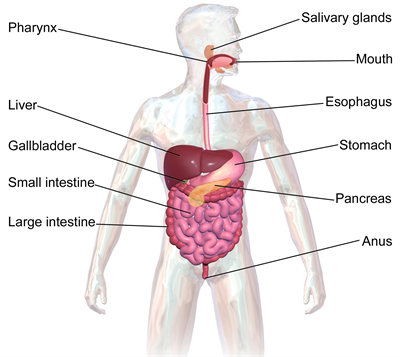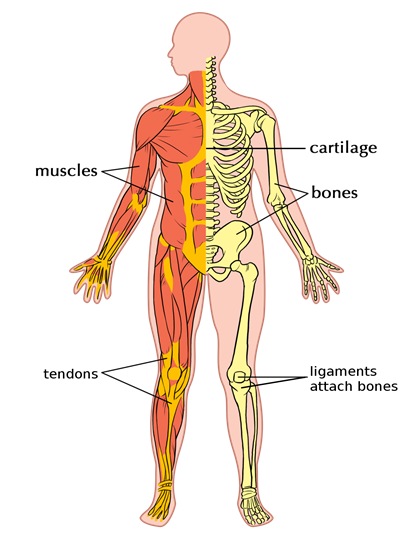PDF chapter test TRY NOW
What is a disease?
The human body is made up of cells which form tissues that in turn form organs and organ systems. The organ systems carry out the physiological functions of the body. Each organ system has specific organs as its parts.
- The digestive system is made up of the stomach and the intestines and helps in the digestion of food.

The digestive system
- The musculoskeletal system of the body is made up of bones and muscles that holds the body parts together and helps the body to move.

Components of the musculoskeletal system
When there is a disease, there is a malfunctioning of these organs, indicated by some symptoms. These symptoms makes us to understand that something is wrong with our bodies. At some point or the other in our lifetime, we suffer from fever, body aches, cold, vomiting, and various other diseases which affect our health. These diseases are caused by a wide range of causes such as disease-causing organisms, malfunctioning of the vital organs, nutrient deficiency, and so on.
Thus the term disease can be defined in a number of ways.
Any abnormality or disturbance caused in our body is known as disease.
The condition in which health is impaired, leading to a deviation from the state of health is known as disease.
Disease is the opposite of health as it is the malfunctioning of the body organs due to one reason or the other.
The term disease means 'without ease'. In other words, it means being uncomfortable.
The following are the reasons that may lead to the development of diseases:
- Infections caused by microbes.
- Lack of balanced diet.
- Poor lifestyle and unhealthy habits.
- Malfunctioning of the body parts.
Differences between health and disease:
Health or disease-free | Disease or health-free |
The state of physical, mental, and social well being. | The state in which diseases are present. |
| It is based on the individual, physical, and social environment. | It is completely based on the individual. |
| The individual has good health. | The individual has poor health. |
| A healthy person can be disease-free. | A disease-free person can be healthy or unhealthy. |
How to stay away from disease?
An individual can stay away from diseases and maintain good health by having a properly balanced diet, keeping the environment clean and maintaining personal hygiene.
Identifying diseases:
Diseases are associated with symptoms and signs. The symptoms are general indications. For example, pain, swelling, and fever are some common symptoms. These indicate that there may be a disease. But do not indicate what the disease is. The signs of diseases are the factors for which the physicians look for as they give a definite indication for the presence of a particular disease. The physicians also advise the diseased individuals for laboratory tests so that the diseases can be pinpointed further.
Reference:
https://upload.wikimedia.org/wikipedia/commons/1/14/Blausen_0316_DigestiveSystem.png
https://www.flickr.com/photos/121935927@N06/13578837903
